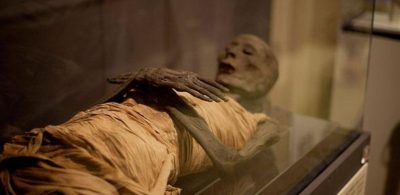The ideal lifespan in ancient Egypt culture was 110 years. Biblical Joseph lived that long. Ramses made it to age 91. How did the ordinary Egyptians do? What can we learn about ancient Egyptian health from an examination of mummified bodies? Egyptian mummies provide evidence of congenital disorders, trauma, vascular disease, tuberculosis, parasitism and dental disease but there are only a few microscopic diagnoses of cancer.
How did the ancient Egyptians treat themselves? The three types of medical professionals in ancient Egypt were: doctors (swnw), secular physicians; priests (wab) healers; and magicians (sau). Training of physicians was by instruction within the family and by schools and apprenticeship. Although medical practice had similarities to the present, with examination, diagnosis and prognosis, Egyptians believed that disease or pain was the effect of hostile divinities or demons and that cure could be achieved by magical or religious incantations. As effective remedies were found, a more rational approach developed.
Michael R. Zimmerman, M.D., Ph.D. is a retired pathologist, formerly Director of the Clinical Laboratories at Hahnemann University Hospital in Philadelphia and Maimonides Hospital in Brooklyn and has been an Adjunct Professor of Anthropology at the University of Pennsylvania.His research has focused the examination of mummies, with field work in Egypt and Alaska as well as numerous museum studies in the U.S., Canada and Europe. He is the author of three books and numerous articles and has given many talks throughout the world.


